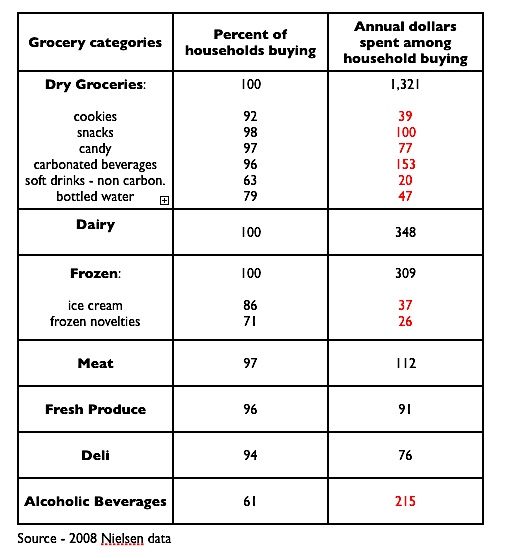(cross-posted from La Marguerite Blog)
We've all witnessed that scene. A mom, obviously not rich, waiting in line with her brood, at the checkout counter, her shopping cart overflowing with bottled water and sodas. Inspired by that image, I decided to take a look at some hard Nielsen data on U.S grocery sales, and came across some rather stunning numbers:

Add it all up, and you've got the majority of households spending between a fourth and a third of their grocery budget on junk, and empty calories. That's a lot of money that could be used on other more nutritious groceries such as milk, fruit, vegetable, meat, and other non processed food. It's also wasted precious dollars in increasingly dire economic times.
There are plenty of reasons why women - the primary grocery shoppers - persist with such deplorable spending habits. Ten, according to a recent report from US News & World Report, '10 Things the Food Industry Doesn't Want You to Know':
1.Junk food makers spend billions advertising unhealthy foods to kids
2.The studies that food producers support tend to minimize health concerns associated with their products
3.Junk food makers donate large sums of money to professional nutrition associations
4.More processing means more profits, but typically makes the food less healthy
5.Less-processed foods are generally more satiating than their highly processed counterparts
6.Many supposedly healthy replacement foods are hardly healthier than the foods they replace
7.A health claim on the label doesn't necessarily make a food healthy
8.Food industry pressure has made nutritional guidelines confusing
9.The food industry funds front groups that fight antiobesity public health initiatives
10.The food industry works aggressively to discredit its critics
Will the stores take the relay and act as advocates for the shoppers? According to another study, this one from Bishop Consulting, 'In-Store Nutritionists Will Be as Commonplace as Pharmacists within Ten Years', some encouraging trends are taking place in grocery retail, along with initiatives from some manufacturers.
